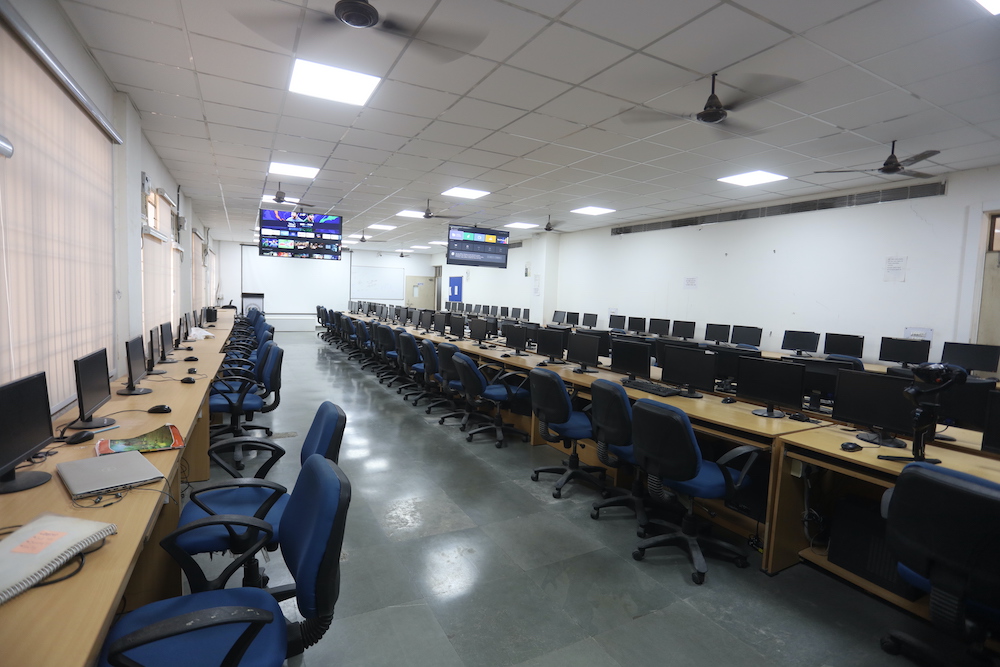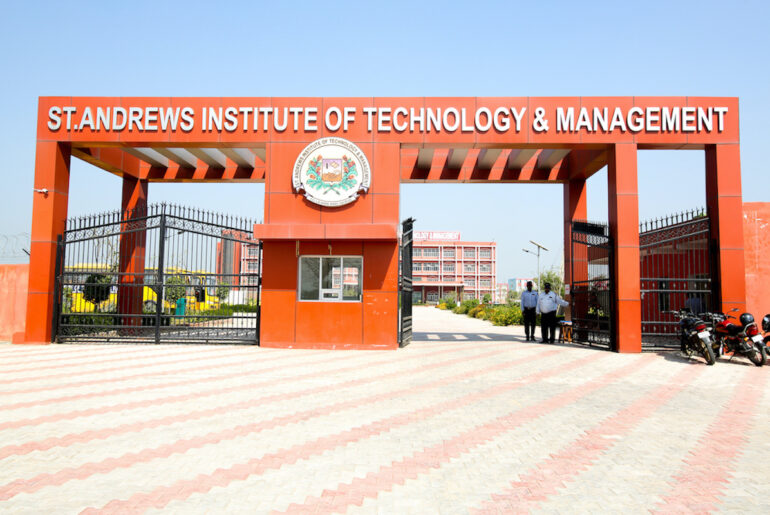What is BBA Course and BBA Full Form?
BBA stands for Bachelor of Business Administration. It is an undergraduate degree program that focuses on various aspects of business management and administration. This article provides BBA course details and all other information related to it.
Some of the most opted courses in India and St. Andrews college or different Engineering college or Management colleges are as follows:-
- Btech
- Btech CSE
- Btech ETCE
- MTech
- BCA
- BBA
- MBA
- MCA
- DPharma – St. Andrews College of Pharmacy
- BPharma – St. Andrews College of Pharmacy
- BArch – St. Andrews College of Architecture
Mission and Vision of BBA course

Image-1 Academic Achievement Awards for BBA Course
Mission of BBA Course:
Provide a holistic education in business administration, fostering critical thinking and leadership skills while preparing graduates for diverse professional environments.
Instill ethical values and a global mindset to drive positive change.
Vision of BBA Course:
Empower students to become innovative leaders in the business world, cultivating a collaborative and inclusive learning environment.
Strive for academic excellence, industry partnerships, and social responsibility to shape future business leaders.
What are the BBA Course Eligibility Criteria?
The BBA eligibility criteria can vary depending on the institution offering the program.

Image-2 BBA Course Building at SAITM Campus
However, some common eligibility criteria typically include:
Educational Qualifications: Candidates must have completed high school or its equivalent from a recognized board or educational institution.
Minimum Percentage: Certain institutions may require a minimum percentage from high school or its equivalent exams for BBA program admission. This ensures candidates meet academic standards. This percentage requirement can vary from institution to institution.
English Proficiency: Proficiency in the English language is often required, as BBA courses are usually conducted in English.
Entrance Exams: Some universities or colleges may require candidates to appear for entrance exams specific to BBA admissions. These exams may test aptitude, reasoning, quantitative skills, and English language proficiency.

Image-3 BBA Course Entrance Exams
Personal Interview: Some institutions may include personal interviews alongside academic qualifications and entrance exams. These interviews help evaluate candidates’ suitability for the course.

Image-4 BBA Course Personal Interview
Prospective students should thoroughly review the eligibility criteria of their desired institutions. Requirements can differ significantly.
Which are the Top BBA Course Entrance Exams?
The specific entrance exams for BBA courses may vary by country and region. However, some of the top entrance exams that are commonly conducted in various countries include:

Image-5 IT Labs at SAITM Campus
IPMAT (Integrated Program in Management Aptitude Test): Conducted by IIM Indore for admission to their Integrated Program in Management.
SET (Symbiosis Entrance Test): Conducted by Symbiosis International (Deemed University) for admission to various undergraduate programs, including BBA, offered by Symbiosis institutes.
DU JAT (Delhi University Joint Admission Test): Conducted by Delhi University for admission to undergraduate management programs, including BBA, offered by colleges affiliated with DU.
NPAT (National Test for Programs After Twelfth): NMIMS, the Narsee Monjee Institute of Management Studies, administers this examination. It serves as an entry requirement for undergraduate programs, such as BBA, offered by NMIMS and its constituent colleges.
UGAT (Under Graduate Aptitude Test): AIMA conducts the examination for admission to undergraduate programs, including BBA, at participating institutes. Many institutes accept this examination for their undergraduate programs, including BBA, facilitated by AIMA.
AIMA UGAT: The Under Graduate Aptitude Test (UGAT), conducted by the All India Management Association, facilitates admission to BBA and other undergraduate courses. Numerous undergraduate programs, including BBA, utilize this test administered by the All India Management Association for admissions.
These exams may vary in terms of their format, syllabus, and eligibility criteria. It’s essential for candidates to check the specific details of each exam they are interested in appearing for in 2024.
Distance BBA Course Admission Process
The BBA admission process for Distance BBA degree programs may vary slightly depending on the institution offering the program.

Image-6 Internship Completion Certificates for BBA Students
However, here is a general outline of the typical admission process:
Research and Selection
Prospective students should research institutions offering Distance BBA degrees, considering factors like accreditation, curriculum, fees, etc. They can then select the ones that align best with their preferences.
Check Eligibility Criteria
Review the eligibility criteria set by the institution. Typically, candidates must have completed high school or its equivalent from a recognized board or educational institution.
Application Form
Obtain the application form from the institution’s website or through other specified means. Fill out the application form accurately and completely.
Submission of Documents
Prepare the necessary documents required for admission, which may include:
- Copy of high school certificate or equivalent
- Mark sheets or transcripts
- Passport-sized photographs
- Identity proof (such as Aadhar card, passport, etc.)
- Any other documents specified by the institution
Application Fee
Pay the application fee, if applicable, as per the instructions provided by the institution.
Submission of Application
Submit the completed application form with required documents and applicable fee to the designated address. Alternatively, follow the institution’s instructions for online submission.
Admission Confirmation
Once the application is processed, the institution will notify the applicant regarding the status of their admission.
If selected, the candidate will receive an admission confirmation along with further instructions.
Payment of Fees
Upon receiving admission confirmation, candidates must pay the required fees for the Distance BBA course by the specified deadline.
Commencement of Studies
After completing the admission formalities and fee payments. The student can commence their studies as per the schedule provided by the institution.
Prospective students must carefully follow institution instructions and meet deadlines for a smooth admission process to Distance BBA programs. Adhering to these guidelines ensures a seamless transition into the program
What are the books recommended for BBA Course Entrance Exam Preparation?

Image-7 SAITM Girls Hostel Building
Preparing for BBA entrance exams requires a comprehensive study plan and access to quality study materials.
The recommended books may differ depending on the exam you’re preparing for. However, here is a list of popular and highly recommended books for BBA entrance exam preparation.
“Quantitative Aptitude for Competitive Examinations” by R.S. Aggarwal
The book covers various topics in quantitative aptitude such as arithmetic, algebra, geometry, and data interpretation. These topics are essential for BBA entrance exams.
“Verbal Ability and Reading Comprehension” by Arun Sharma
The book emphasizes enhancing verbal ability and comprehension skills. These skills are vital for sections like English language, comprehension, and verbal reasoning in BBA entrance exams.
“Logical Reasoning and Data Interpretation for the CAT” by Nishit K. Sinha
The book addresses diverse topics in logical reasoning and data interpretation. These areas are frequently tested in BBA entrance exams to assess analytical and problem-solving abilities.
“Word Power Made Easy” by Norman Lewis
This book comes highly recommended for enhancing vocabulary skills. Strong vocabulary is essential for performing well in the English language section of BBA entrance exams.
“A Modern Approach to Logical Reasoning” by R.S. Aggarwal
The book offers thorough coverage of logical reasoning topics. These topics, such as logical deduction, coding-decoding, series, and puzzles, are frequently tested in BBA entrance exams.
“NCERT Books”
For the quantitative aptitude section, it’s advised to study relevant topics from NCERT mathematics textbooks of classes 9th to 12th. Similarly, for logical reasoning, referring to these textbooks is recommended.
“General Knowledge” by Manohar Pandey or Lucent’s General Knowledge
The books encompass various general knowledge topics such as current affairs, history, geography, science, and politics. These topics are crucial for the general awareness section of BBA entrance examinations.
“Previous Years’ Question Papers”
Solving previous years’ question papers of BBA entrance exams aids in understanding the exam pattern and types of questions. It also improves candidates’ time management skills.
To enhance preparation for top BBA entrance exams, utilize mock tests, online resources, and coaching materials. These supplements bolster overall readiness for the exams.
Always consult the syllabus and exam pattern provided by exam authorities for specific preparation guidance. Following these guidelines ensures effective exam preparation.
What are the Different Types of BBA Courses?
BBA courses offer students a thorough understanding of business management and administration. They cover various aspects comprehensively.

Image-8 Projects Presentation Session for BBA Students
While BBA programs typically cover fundamental topics, specialized BBA degrees concentrate on specific business areas. These degrees tailor education to particular focuses within the field. Some of the different types of BBA courses include:
General BBA
This standard BBA course encompasses fundamental concepts in business administration. It covers areas such as management principles, accounting, finance, marketing, human resources, and organizational behaviour.
BBA in Finance
This program concentrates on financial management and related areas. It prepares students for careers in finance and financial services by covering investment analysis, banking, risk management, and financial markets.

Image-9 BBA in Finance Management
BBA in Marketing
This program prioritizes marketing strategies and consumer behavior. It equips students for marketing and sales roles through instruction in advertising, branding, market research, sales management, and digital marketing.

Image-10 BBA in Marketing Management
BBA in Human Resource Management (HRM)
This program centers on HR practices and talent management. It prepares students for HR roles by covering employee relations, performance management, compensation, training, and labor laws.

Image-11 BBA in HRM
BBA in International Business
This program addresses the global business environment and international operations. This program prepares students for multinational corporations and global business careers. It covers international marketing, finance, management, supply chain, and trade.

Image-12 BBA in International Business
BBA in Entrepreneurship
This program is designed for students interested in starting and managing their own businesses.

Image-13 BBA in Entrepreneurship
It covers entrepreneurship concepts, business planning, startup funding, innovation, small business management, and entrepreneurial finance.
BBA in Operations Management
This program emphasizes operations strategy and supply chain management. This program prepares students for roles in production, operations, and supply chain management. It covers quality management, project management, logistics, and operations analytics to equip students with necessary skills.

Image-14 BBA in Operations Management
BBA in Information Technology (IT) Management
This program integrates business administration principles with IT concepts. Students are prepared for IT management roles through instruction in database management, information systems, software development, project management, and cybersecurity. This program equips students with the necessary skills for success in IT management.

Image-15 BBA in Information Technology (IT) Management
These are common BBA course types, but institutions may offer other specialized programs based on market demand and emerging business trends. Additional specialized BBA programs may be available to cater to specific industry needs
BBA Course Duration
The duration of a BBA course varies based on the country and educational institution. It typically ranges depending on these factors.

Image-16 Administration Building of SAITM Campus
However, in most cases, the standard duration of a BBA course is three to four years when pursued full-time.
In India, undergraduate degree programs usually last three years. A BBA course is typically completed within this timeframe.
In some cases, BBA programs may extend to four years. This extension is particularly common when programs involve internships, co-op programs, or extra coursework.
Students should verify the duration of the BBA course they’re interested in. It can vary between institutions and regions.
Full-Time BBA

Image-17 BBA Students Project Competition at SAITM Campus
A full-time BBA program, also referred to as a Bachelor of Business Administration program, usually spans three to four years. It offers students an immersive educational experience. The curriculum encompasses essential business disciplines such as finance, marketing, HR, and operations.
Through lectures, projects, internships, and industry interactions, students gain theoretical knowledge and practical skills vital for managerial roles.
This intensive learning experience fosters critical thinking, problem-solving, and teamwork abilities, preparing graduates for diverse career paths in various sectors.
Full-time study allows students to deeply engage with coursework. It also enables them to build professional networks. Additionally, it fosters the development of leadership qualities crucial for success in the dynamic business world.
Course Comparison: BBA, BBM and BBS
BBA, BBM, and BBS are undergraduate-level programs in business administration. However, they may differ in terms of their focus, curriculum, and career outcomes. These variations influence students’ educational experiences and future career paths.

Image-18 Boys Hostel Building at the SAITM Campus
Here’s a comparison of the three:
Bachelor of Business Administration (BBA)

Image-19 Convocation Ceremony for Graduates at SAITM Campus
Focus
This program furnishes a broad understanding of a company’s functional aspects and their interconnections. It also enables specialization in specific areas.
Curriculum
Covers general business courses along with advanced courses for specific concentrations.
Common areas of study include Marketing, Finance, HR, and Operations Management.
Career Paths
Prepares students for managerial roles in various sectors, including corporate and entrepreneurial settings.
Graduates can pursue roles like Marketing Manager, Human Resources Manager, Business Consultant, and Financial Analyst.
Bachelor of Business Management (BBM)
Focus
Similar to BBA, but with a stronger emphasis on leadership and management skills within the business context.
Curriculum
Focuses on managerial economics, business law, ethics, and strategic management.
The program aims to develop critical thinking, problem-solving, and decision-making skills.
Career Paths
Designed to prepare students for leadership positions in business, government, and non-profit organizations.
Graduates often move into roles such as Operations Manager, Project Manager, Sales Manager, or Business Analyst.
Bachelor of Business Studies (BBS)
Focus
Combines practical business knowledge with a comprehensive understanding of the economic, political, and social factors that affect global business environments.
Curriculum
Offers a mix of business, economics, and sociology courses, emphasizing the application of business principles to real-world scenarios.
Topics include international business, trade, finance, and economic development.
Career Paths
Equips students for a broad range of careers in international business, trade, and finance.
Graduates can work in roles such as International Business Analyst, Trade Coordinator, Economic Analyst, or Policy Advisor.
Key Differences
Scope and Focus
BBA provides a comprehensive overview of business functions. BBM focuses specifically on management and leadership, while BBS offers a global perspective on business studies.
Curriculum and Specializations
Each program has its distinct curriculum that caters to its focus. While there’s overlap, the core intent and specialized courses vary.
Career Outcomes
While all three degrees prepare students for business careers, their potential roles and industries can vary. This difference stems from the skills and knowledge acquired during the program.
Choosing between a BBA, BBM, and BBS hinges on career aspirations and interests in business functions, leadership, or global business environments. Consider the specific curriculum and opportunities offered by the institutions you’re considering.
BBA Subjects 1st Year
During the first year of a BBA (Bachelor of Business Administration) program, students usually engage in foundational courses. These courses aim to impart a broad understanding of various aspects of business administration.

Image-20 Highest Salary Package
The specific subjects may vary slightly depending on the university or institution. However, common subjects typically included in the first year curriculum of a BBA course are outlined here.
Principles of Management
This course introduces students to the basic principles and functions of management, including planning, organizing, staffing, directing, and controlling.
Business Communication
This course focuses on developing students’ communication skills, both written and oral, in a business context. Topics may include business correspondence, report writing, presentations, and interpersonal communication.
Business Mathematics and Statistics
This course covers basic mathematical and statistical concepts relevant to business decision-making, such as arithmetic, algebra, probability, and data analysis.
Financial Accounting
This course familiarizes students with the basics of financial accounting. It covers topics such as financial statement preparation and analysis, accounting principles, and concepts.
Microeconomics
This course offers an introduction to microeconomic theory. It covers topics like supply and demand, consumer behavior, production and costs, market structures, and pricing.
Computer Applications in Business
This course familiarizes students with computer applications commonly used in business, such as word processing, spreadsheets, databases, and presentation software.
Business Environment
This course examines the external factors that influence business operations, including economic, social, political, legal, and technological factors.
Organizational Behavior
This course delves into the behavior of individuals and groups within organizations. It covers topics like motivation, leadership, communication, teamwork, and organizational culture.
Business Ethics and Corporate Governance
This course familiarizes students with ethical issues and dilemmas in business. It also covers principles of corporate governance and social responsibility.
Introduction to Marketing
This course provides an overview of marketing concepts and principles, including market segmentation, targeting, positioning, product, pricing, promotion, and distribution.
These are some of the common subjects that students may study in the first year of a BBA course.
The exact curriculum may vary depending on the university’s requirements and the specific focus of the program.
What is the BBA Course Fees in Top BBA Government Colleges?
BBA course fees at top government colleges can vary significantly. Factors such as college reputation, location, facilities, and associated costs contribute to this variation.

Image-21 Best Engineering College Award
However, government colleges typically have lower tuition fees compared to private institutions. Here are some approximate ranges for BBA course fees in government colleges:
IIM Indore (Integrated Program in Management)
Although IIMs are esteemed for their management programs, the fees for their BBA equivalent programs, such as IPM, can be comparatively lower. This is in contrast to the fees for their postgraduate courses.
At IIM Indore, the duration of the BBA course usually ranges from four to six years. The fees for the entire program typically fall between INR 4 to 6 lakhs.
Faculty of Management Studies (FMS), Delhi University
FMS, as a prestigious management institution in India, offers a BBA course with a notably reasonable fee structure. This stands out in comparison to the BBA course fees charged by private institutions.
The total fees for the BBA course at FMS Delhi typically range from INR 60,000 to 1.5 lakhs. This covers the entire duration of the course.
Indian Institutes of Information Technology (IIITs)
Some IIITs offer BBA degrees with fees that are relatively lower compared to other government management institutions.
At IIITs, the duration of the BBA course typically ranges from three to five years. The fees for the entire duration of the course generally fall between INR 1 to 3 lakhs.
Government colleges affiliated with State Universities
Fees for BBA degrees in government colleges affiliated with state universities can vary significantly. This variation depends on the state and the specific college.
In general, the fees for BBA degrees in such colleges may range from INR 10,000 to 50,000 per year.
It’s important to note that these fee ranges for BBA courses are approximate. They can vary based on factors such as the BBA course fee structure, including admission process (general, OBC, SC/ST, etc.), hostel fees, examination fees, and other miscellaneous expenses.
Furthermore, government colleges frequently provide scholarships and financial aid to deserving students. These resources can significantly alleviate the overall cost of education.
Prospective students should refer to the official websites of respective colleges for accurate and up-to-date information on fees and admission processes. These sources offer the most reliable information regarding fees and admission procedures.
Which are the Top BBA Specialisations?
BBA (Bachelor of Business Administration) programs commonly provide specializations or concentrations for students. These specializations enable students to tailor their studies to specific business areas aligned with their interests and career aspirations.

Image-22 Students Cheer Post-Placement Success
Some of the top BBA specializations include:
Finance:
Specializing in finance focuses on financial management, investment analysis, banking, risk management, financial markets, and corporate finance.
Graduates with a finance specialization can pursue careers in banking, investment firms, corporate finance departments, and financial consulting.
Marketing:
Specializing in marketing emphasizes marketing strategies, consumer behavior, branding, advertising, market research, digital marketing, and product management.
Graduates with a marketing specialization can pursue careers in marketing agencies, advertising firms, sales departments, and brand management roles.
Human Resource Management (HRM):
Specializing in HRM focuses on talent acquisition, employee relations, performance management, compensation and benefits, training and development, and HR strategy.
Graduates with an HRM specialization can pursue careers in human resources departments, recruitment agencies, training firms, and organizational development roles.
International Business:
Specializing in global business encompasses various key areas. These include the global business environment, international marketing, cross-cultural management, global supply chain management, international trade, and global business strategy.
Graduates specializing in global business can seek employment opportunities in multinational corporations, global trade organizations, and global consulting firms. They may also explore roles in export-import departments.
Entrepreneurship:
Specializing in entrepreneurship focuses on business planning, startup management, innovation, venture capital, entrepreneurial finance, and small business development.
Graduates specializing in entrepreneurship can establish their own businesses or engage in startup accelerators and venture capital firms. Alternatively, they may pursue roles in business incubation centers.
Operations Management:
Specializing in operations management covers operations strategy, supply chain management, quality management, project management, logistics, and operations analytics.
Graduates with an operations management specialization can pursue careers in manufacturing firms, logistics companies, supply chain departments, and consulting firms.
Information Technology (IT) Management:
Specializing in IT management integrates business administration principles with IT concepts. This includes database management, information systems, software development, IT project management, and cybersecurity.
Graduates with an IT management specialization can pursue careers in IT departments, technology consulting firms, software companies, and IT project management roles.
These are some of the top BBA specializations that are in demand and offer diverse career opportunities in various sectors of the business world.
Career Options After Bachelor of Business Administration
After completing a Bachelor of Business Administration (BBA) degree, graduates have a wide range of career options available to them across various industries.

Image-23 Best Academic Institute Award by CM of Delhi
Some common career paths for BBA graduates include:
Management Trainee/Assistant Manager
Many companies recruit BBA degree holders for entry-level management trainee or assistant manager positions in areas such as marketing, finance, HR, operations, and sales.
These roles typically involve learning about the company’s operations, processes, and management practices while gaining hands-on experience in various departments.
Marketing Executive/Analyst
BBA degree holders can pursue careers in marketing as marketing executives, marketing analysts, or marketing assistants.
They may be involved in market research, advertising, brand management, digital marketing, social media marketing, and promotional activities to help companies reach their target audience and achieve their marketing goals.
Financial Analyst/Accountant
BBA graduates with a specialization in finance can work as financial analysts, financial associates, or accountants in corporate finance departments, investment firms, banks, or financial consulting firms.
In the realm of financial management, professionals may analyze financial data, compile financial reports, evaluate investment prospects, and offer financial guidance to clients or management.
Human Resources Specialist/Coordinator
BBA degree holders with a specialization in human resource management (HRM) can pursue careers as HR specialists, HR coordinators, or HR assistants in organizations.
They may be responsible for recruitment, employee relations, performance management, training and development, compensation and benefits administration, and HR policy implementation.
Operations Manager/Coordinator
BBA degree holders with a specialization in operations management can work as operations managers, operations coordinators, or supply chain analysts in manufacturing firms, logistics companies, or service organizations.
Entrepreneur/Small Business Owner
BBA graduates with an entrepreneurial mindset may choose to start their own business ventures or work in family-owned businesses.
They can apply their business knowledge and skills to identify opportunities, develop business plans, secure funding, manage operations, and grow their businesses in various industries.
Consultant/Business Analyst
BBA graduates can work as consultants or business analysts for consulting firms, market research companies, or management advisory firms.
They may provide strategic advice, conduct market research, analyze business processes, identify areas for improvement, and recommend solutions to clients to help them achieve their business objectives.
Further Education
Some BBA degree holders may choose to pursue further education by enrolling in postgraduate programs such as Master of Business Administration (MBA), specialized master’s degrees, or professional certifications.
Advanced degrees or certifications can help BBA graduates enhance their knowledge, skills, and career prospects in specific areas of business.
These are just a few examples of the career options available to BBA degree holders.
SET BBA Expected Cut off

Image-24 IT Labs of SAITM, Gurugram Campus
The expected cutoff for the SET BBA program in India can vary depending on various factors such as the total number of applicants, the difficulty level of the exam, and the number of seats available. Here’s an overview of the expected cutoff trends for the SET BBA exam based on previous years’ data:
- General Category: For the general category, the cutoff has been relatively high, with previous years seeing figures around 81 to 91 for different institutions affiliated with Symbiosis.
- Reserved Categories: For categories like SC (Scheduled Caste) and ST (Scheduled Tribe), the cutoffs are notably lower to accommodate reservation policies. Previous cutoffs have ranged from 30 to 49 for ST and 40 to 45 for SC in various years.
- Differently Abled Candidates: Candidates with disabilities also have a reserved quota, and their cutoffs have been around 44 to 58 in past years.
- Kashmiri Migrants: This category has specific reservations, with cutoffs previously recorded around 51.
- Institute-specific Trends: Each institute affiliated with Symbiosis may have slightly different cutoffs based on their specific criteria and the number of applications received.
- Seats Availability: The number of seats available for the BBA program can also influence the cutoff. For example, Symbiosis Center for Management Studies, Pune, offers 300 seats for its BBA program, which can affect the competitiveness and thereby the cutoffs.
- Selection Procedure: Post meeting the cutoff, candidates are required to undergo further selection processes which may include Personal Interaction (PI), Written Ability Test (WAT), and other criteria depending on the institute.
It’s important to keep an eye on the official announcements from Symbiosis for the most accurate and up-to-date cutoff information for the current year. The trends mentioned here are based on past data and are meant to provide a general idea of what to expect
Which is better: BBA or BCom Course?
The choice between a BBA (Bachelor of Business Administration) and a BCom (Bachelor of Commerce) course depends on various factors such as your interests, career goals, and preferred area of study. Both BBA and BCom courses have their own merits and advantages:

Image-25 Online Workshop for Students
BBA (Bachelor of Business Administration):
Focus on Business
BBA courses are specifically designed to provide a comprehensive understanding of various aspects of business administration, including management principles, finance, marketing, HR, operations, and organizational behavior.
Practical Orientation
BBA courses often have a practical and skill-oriented approach, incorporating case studies, projects, internships, and industry interactions to provide students with hands-on experience and real-world exposure.
Specializations
BBA courses typically offer specialized tracks or concentrations in specific areas of business, allowing students to tailor their studies according to their interests and career aspirations.
Career Opportunities
BBA degree holders are well-equipped to pursue entry-level managerial positions in various industries, as well as further studies in business-related fields such as MBA or specialized master’s programs.BCom (Bachelor of Commerce):
Broad Coverage
BCom programs offer a broader coverage of subjects related to commerce and trade, including accounting, finance, economics, taxation, business law, and corporate governance.
Flexibility
BCom courses provide students with a flexible curriculum, allowing them to choose elective subjects based on their interests and career goals.
Students can opt for specialized electives in areas such as accounting, finance, taxation, or global business.
Professional Qualifications
BCom graduates often pursue professional qualifications such as Chartered Accountancy (CA), Certified Management Accountant (CMA), Chartered Financial Analyst (CFA), or Company Secretaryship (CS) to enhance their career prospects and specialization in specific areas.
Diverse Career Paths
BCom graduates have a wide range of career options available to them across various industries, including accounting firms, financial institutions, consulting firms, government agencies, and non-profit organizations.
Ultimately, the choice between a BBA and a BCom course depends on your individual preferences, strengths, and career aspirations.
If you are interested in pursuing a career in business management and administration, a BBA course may be more suitable.
List of Institutes Offering BBA Courses

Image-26 Main Block of SAITM Gurugram
Here’s a detailed list of institutes offering BBA courses:
Indian Institutes of Management (IIMs): Renowned for their management programs, IIMs offer BBA courses with a focus on various aspects of business administration.
St. Andrews Institute of Technology and Management: St. Andrews Institute of Technology and Management offers BBA courses with a curriculum designed to equip students with fundamental business knowledge, practical skills, and industry insights necessary for success in the field of business administration.
Delhi University (DU): DU’s Faculty of Management Studies (FMS) offers BBA courses focusing on foundational business skills and practical knowledge.
Christ University: Christ University’s BBA courses emphasize holistic development, including theoretical knowledge and practical exposure through internships and projects.
University of Mumbai: The University of Mumbai offers BBA courses through affiliated colleges, covering essential business disciplines and providing industry exposure.
These institutes are recognized for their quality education, industry connections, and opportunities for experiential learning, making them popular choices for pursuing BBA degrees.
Browse BBA Colleges by Locations
Here’s a breakdown of BBA colleges by locations:

Image-27 Project Competition held by SAITM
Delhi NCR:
- St. Andrews Institute of Technology and Management, Gurgaon
- Faculty of Management Studies (FMS), University of Delhi
- Delhi University
Mumbai:
- University of Mumbai
- Narsee Monjee Institute of Management Studies (NMIMS), Mumbai
- Symbiosis Institute of Business Management (SIBM), Pune (Mumbai Campus)
- K J Somaiya Institute of Management Studies and Research, Mumbai
- N. L. Dalmia Institute of Management Studies and Research, Mumbai
- SIES College of Management Studies, Mumbai
Bangalore:
- Christ University, Bangalore
- Symbiosis Institute of Business Management (SIBM), Bangalore
- Alliance University, Bangalore
- IFIM Business School, Bangalore
- Acharya Bangalore B-School (ABBS), Bangalore
- PES University, Bangalore
Pune:
- Symbiosis Centre for Management Studies (SCMS), Pune
- MIT World Peace University, Pune
- Indira College of Commerce and Science, Pune
- Brihan Maharashtra College of Commerce (BMCC), Pune
- Symbiosis Institute of International Business (SIIB), Pune
- Flame University, Pune
Chennai:
- Loyola College, Chennai
- Madras Christian College (MCC), Chennai
- Anna University, Chennai
- SRM Institute of Science and Technology, Chennai
- Presidency College, Chennai
- Ethiraj College for Women, Chennai
These are just a few examples of BBA colleges in various locations. Each of these colleges offers a unique set of courses, faculty, and facilities for students pursuing a Bachelor of Business Administration degree.
What is the Average BBA Salary Offered in India?

Image-28 Awards Distribution by Manoj Tiwari
The average salary offered to BBA degree holders in India can vary depending on various factors such as the industry, job role, location, company size, and individual’s skills and experience.
However, to provide you with a general idea, the average starting salary for BBA graduates in India typically ranges from INR 3 lakh to INR 6 lakh per annum.
Here’s a breakdown of the average salary offered to BBA graduates in some common industries:
Consulting
BBA degree holders may find opportunities in consulting firms where the average starting salary can range from INR 4 lakh to INR 8 lakh per annum.
Financial Services
In sectors such as banking, insurance, and investment banking, BBA graduates may receive starting salaries ranging from INR 3 lakh to INR 6 lakh per annum.
Information Technology (IT) Services
Individuals with a BBA working in IT services companies may receive starting salaries ranging from INR 3 lakh to INR 5 lakh per annum.
Retail
In retail companies, BBA graduates may receive starting salaries ranging from INR 3 lakh to INR 5 lakh per annum.

Image-29 Retail Management
Manufacturing
In manufacturing companies, BBA graduates may receive starting salaries ranging from ₹3 lakh to ₹6 lakh per annum.
E-commerce
With the growth of e-commerce companies in India, individuals with a BBA may find opportunities with starting salaries ranging from ₹3 lakh to ₹6 lakh per annum.
It’s important to note that these are approximate figures, and actual salaries may vary based on individual circumstances and market conditions.
Additionally, individuals with a BBA who pursue further education, such as an MBA (Master of Business Administration) or specialized master’s degree, may command higher salaries as they progress in their careers.
Frequently Asked Question (FAQs)
Are there any options to pursue online BBA courses in India?
Yes, there are several options available to pursue online BBA courses in India.
Many universities and educational institutions offer online BBA programs, allowing students to study remotely and complete their degree entirely online.
These online BBA courses provide flexibility and convenience, making them suitable for individuals who may not be able to attend traditional on-campus classes due to various commitments or geographical constraints.
What is Data Analyst?
A Data Analyst is a professional who collects, interprets, and analyzes data to uncover insights and support decision-making.
They utilize statistical techniques, programming languages, and data visualization tools to extract valuable information from complex datasets.
What is Operations Manager?
An operations manager oversees the daily activities of a company to ensure efficient production, delivery, and quality of goods or services.
They manage resources, streamline processes, and implement strategies to meet organizational goals while maintaining high standards of productivity, safety, and customer satisfaction.
Data Administrator
A Data Administrator is responsible for managing an organization’s data assets, including storage, security, and accessibility.
They oversee data backups, ensure compliance with regulations, implement data policies, and optimize data systems for efficient use across the organization.
Environmental Engineer
An Environmental Engineer applies scientific principles to address environmental challenges.
They design and implement solutions to manage pollution, conserve resources, and protect ecosystems.
Their work aims to promote sustainability and mitigate the impact of human activities on the environment.
Product Manager
A Product Manager is responsible for guiding the development and marketing of a product throughout its lifecycle.
They define the product vision, gather and prioritize requirements, collaborate with cross-functional teams, and ensure the product meets customer needs while achieving business objectives and profitability.
Healthcare Social Worker
A Healthcare Social Worker provides support and assistance to patients and their families facing medical challenges.
They assess social and emotional needs, connect clients with resources, coordinate care plans, and advocate for individuals within the healthcare system to improve overall well-being.
What is the course of BBA?
A Bachelor of Business Administration course provides foundational knowledge in various aspects of business, including management, finance, marketing, and organizational behavior.
It equips students with essential skills for leadership roles in diverse industries.
Coursework typically covers subjects like accounting, economics, business law, and strategic management, preparing graduates for entry-level positions or further academic pursuits in business-related fields.
Which BBA course is best?
The “best” BBA course depends on individual preferences, career goals, and the reputation of the institution offering the program.
However, Undergraduate business administration programs accredited by recognized institutions, with a strong curriculum, experienced faculty, industry connections, and opportunities for internships or practical experience, are generally considered advantageous for students seeking quality education and career prospects.
What is a BBA degree?
A Bachelor of Business Administration degree is an undergraduate program that provides students with foundational knowledge and skills in various aspects of business management, including finance, marketing, human resources, and operations.
It prepares graduates for entry-level positions in the corporate realm or further academic pursuits.
Which BBA course has highest salary?
BBA courses details with specialisations in Finance, Management Consulting, and Information Technology often have the highest salary potential.
Finance graduates can pursue roles in investment banking or corporate finance, while Management Consulting and Information Technology graduates can secure lucrative positions in consulting firms or tech companies, respectively, offering competitive salaries.
What is the subjects in BBA?
Subjects in a Bachelor of Business Administration (BBA) program typically include foundational courses in business disciplines such as accounting, economics, marketing, finance, operations management, and organizational behavior.
Additionally, students may study business law, strategic management, entrepreneurship, information technology, and ethics.
Which type of BBA is best?
Subjects in a Bachelor of Business Administration (BBA) program typically include foundational courses in business disciplines such as accounting, economics, marketing, finance, operations management, and organizational behavior.
Additionally, students may study business law, strategic management, entrepreneurship, information technology, and ethics.
Some programs also offer electives or concentrations in specialized areas like international business, human resource management, or supply chain management.
Is BBA 3 years or 4 years?
The duration of a Bachelor of Business Administration (BBA) program can vary depending on the institution and the country’s education system.
In many countries, including India, a BBA course details is typically three years long for students who have completed their secondary education (12 years of schooling).
What is BBA course useful for?
A BBA course detail is useful for individuals aspiring to pursue careers in various sectors of business and management.
Moreover, it furnishes foundational knowledge, practical skills, and critical thinking abilities essential for roles in various domains. These include finance, marketing, human resources, operations, entrepreneurship, consulting, and more, spanning diverse industries and organizations.
Why Choose a BBA Course?
Choosing a BBA course offers numerous benefits. It provides a solid foundation in business principles, equips you with practical skills applicable to various industries, and enhances your career prospects.
Additionally, it fosters critical thinking, problem-solving, and leadership abilities essential for success in the corporate realm.





